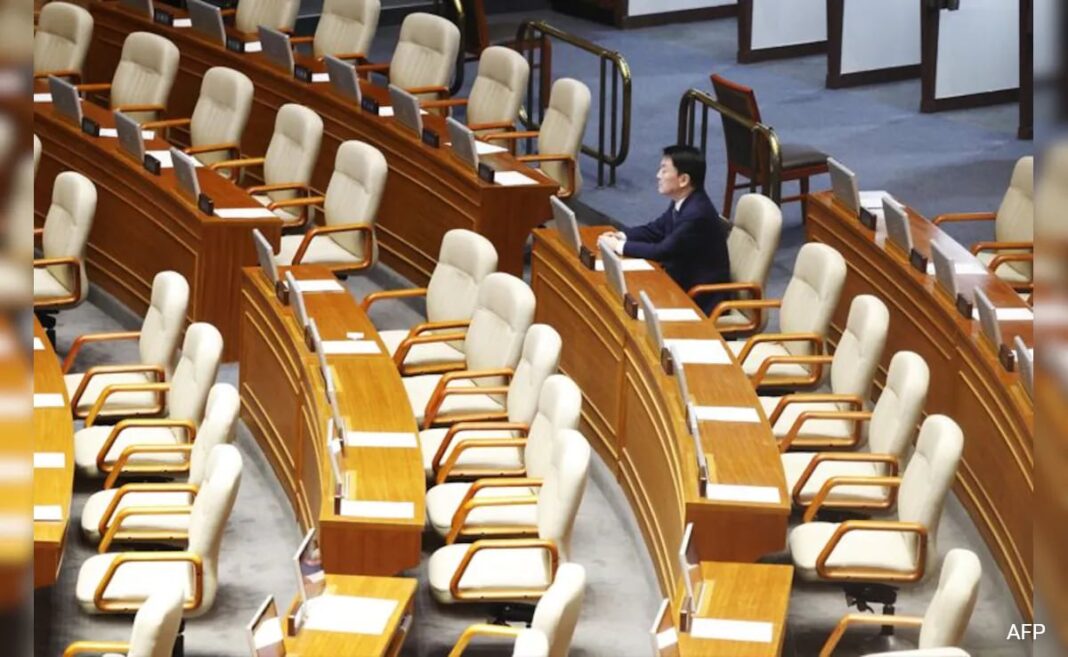[
]

Seoul:
As South Korean lawmakers tried to impeach President Yoon Suk Yeol for declaring martial law, ruling party MPs marched out of the chamber to thwart the effort — except for Ahn Cheol-soo.
Ahn — a self-made multi-millionaire, trained doctor and software designer — sat alone in his party’s bank of chairs in the National Assembly debating hall, one of just two members of the ruling People Power Party to vote to remove Yoon from office.
Despite tens of thousands of protesters outside, demanding the leader be removed after he sent soldiers in helicopters to parliament in a bid to overturn civilian rule, the impeachment motion failed by not meeting the quorum.
Days earlier, lawmakers from both parties had come together, jumping fences, barricading doors with office furniture, and battling special forces troops as they raced to vote down the martial law declaration.
But then the ruling party closed ranks — saying Yoon had promised to resign and hand power to the prime minister and party chief, in what the opposition has called an unconstitutional power grab and “second coup”.
Ahn said he was booed and heckled at a party meeting, when he tried to argue with other lawmakers that the president needed to be held to account.
“The idea that a president responsible for upholding the constitution of the world’s 10th largest economy would stage an unconstitutional coup is beyond imagination,” Ahn told AFP on Monday in his parliamentary office overlooking the National Assembly.
“Who could have foreseen he would commit such an unconstitutional act as president?”
Always unpopular, Yoon’s approval rating has hit a record low of just 11 percent, a Gallup poll showed Monday, and further mass protests are expected this coming weekend, when the opposition will try again to impeach.
A “sense of duty” to uphold the constitutional order weighed heavily on him as he thought about how he should vote, Ahn told AFP.
“I have always believed that my role in politics is to represent the people’s will, not my own personal interests. That is why I stayed to cast my vote.”
“I didn’t vote for the opposition party. I voted for the people”
Presidential candidate
Ahn himself had ambitions to be president: he ran in 2022, but dropped out and supported Yoon just a week before the election, with his support proving crucial in the neck-and-neck poll, which Yoon won by the narrowest margin in South Korean history.
His party merged with the PPP, but Ahn now finds himself at odds with his parliamentary colleagues, who are officially calling for an “orderly exit” for Yoon — but in reality, experts say, trying to buy time ahead of an election they’re likely to lose.
The PPP blocked impeachment, saying that Yoon had agreed to step down at some unspecified point in the future, with the country to be run by the prime minister and party chief in the interim.
But Ahn insists this is insufficient.
“I had expected Yoon to announce when and how he would resign and to detail plans for the formation of a joint governing body with ruling and opposition parties,” he told AFP.
“Instead, he handed everything over to the ruling party,” he said.
Without a clear roadmap from either the president or his party, “I concluded I had no choice but to support impeachment.”
Ahn said he would vote for impeachment again.
“According to the constitution, each MP is a constitutional agent. Voting according to one’s conscience, even if it goes against the party’s official stance, takes precedence.”
Yoon has lost the confidence of not only the South Korean public but also international allies, leaving him “incapable of continuing his duties as president,” Ahn said.
“He must personally explain when and how he intends to resign.”
Household name
Ahn is a household name in South Korea and was widely known even before entering politics in 2012 with his first presidential bid.
As a medical student in the 1980s, he wrote a programme to remove a virus from his computer and went on to pursue parallel careers as a software developer, doctor, and professor.
In 1995, he founded AhnLab, now the largest antivirus software company in South Korea, with a market capitalisation of nearly $635 million.
He has run as a presidential candidate multiple times, but it was his bid in 2022 that has proved most impactful.
Six days before the election, he endorsed Yoon — a move analysts described as crucial to Yoon’s razor-thin victory margin of less than one percentage point.
If he had known then what he knows now, Ahn said, he would not have done it.
“Not just me — others would also have been unable to vote for him if we had known this information.”
(Except for the headline, this story has not been edited by NDTV staff and is published from a syndicated feed.)


